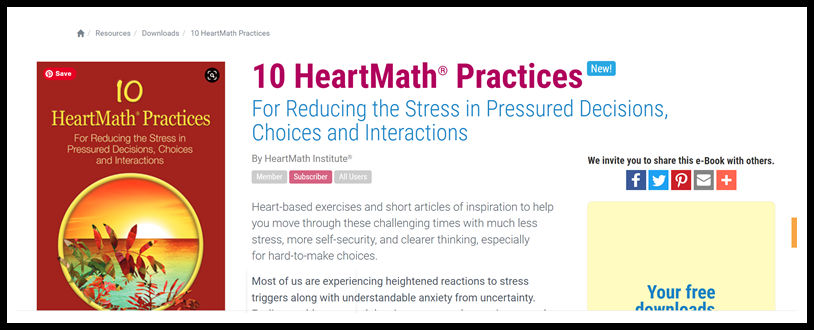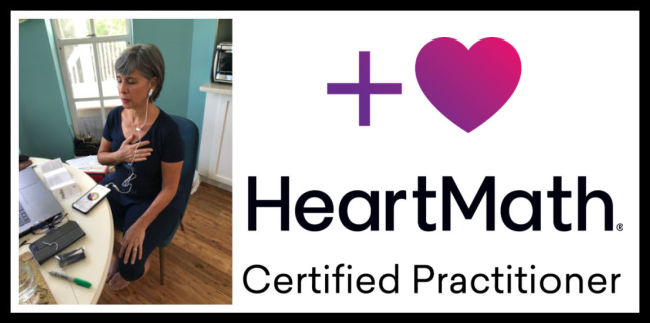
How much time each day do you need to manage your stress and feel your best?
I used to think I needed to spend 30 minutes in the morning meditating, 1 hour or so doing exercise daily, and another 30 minutes at night back to meditating. However, after many years of starting and stopping the meditation practice, I decided in my busy life with my active mind this was not sustainable. I also recognized that I was more stressed out about not keeping this commitment, negating any positive result that I was receiving. I kept hunting around for practices that would be easily accessible, available at any time of the day, and had science behind it. That is when I discovered the HeartMath system of emotional self-regulation and Heart/brain coherence tools. I still spend an hour or more exercising and doing yoga daily, however, I no longer feel guilt and frustration over not doing an hour of seated meditation for my wellbeing.
More power to any of you who have the time, ability, and interest in meditating like this daily. But if this is a struggle for you then I would have you consider the power of HeartMath tools to shift your nervous system from the chronic stress state to a more coherent state of health and wellbeing. The HeartMath Institute has just released a new FREE guide including 10 Practices for Reducing Stress in Pressured Decisions, Choices and Interactions. Click here to download your copy. You will be put on their mailing list. But what they send is very valuable.

Just 15-20 Minutes Daily!
I wanted to review with you a few of their ideas that make good sense to me. These are practices that I teach my clients as part of my health coaching, yoga teaching, and HeartMath coaching services. See here for more.
Take the time at the beginning of your day to figure out what Heart quality you would like to bring to your day. In just a few minutes of Heart Focused breathing with the activation of renewing emotions you can prep for desirable outcomes. HeartMath calls this checking in with your inner weather as you start the day and if you notice your weather is stormy or clouded by gloom, then a simple two-minute practice of shifting your emotions while breathing to your heart can work wonders. Throughout the day, pausing and checking in with yourself can reset your system, particularly before or after stressful events. Then at the end of the day, a few minutes of practicing HeartMath tools right before bed can help you sleep. All in all, this may take you 15-20 minutes daily divided into small, manageable time periods. It becomes like any other routine during the day—easier and easier as you incorporate it into your life.

Can You Spot Check Your Emotions or Attitude Right Now?
While many of these ideas have been around, we tend to forget to use them throughout the day like checking in with yourself periodically to notice what is going on with your thoughts, feelings, and attitudes. HeartMath calls this “Spot Checking.” What you may notice is that you have an underlying yet persistent emotionally-depleting soundtrack going on in your head all day without even being aware of it. It is no wonder that at the end of the day, a person would feel exhausted and want to just numb out. Through the awareness of these depleting thoughts, feelings, and attitudes, we can decide during the few minutes of spot-checking to shift them either to neutral or to a more uplifting place.
This past week I worked with 60 pre-service teachers at FGCU sharing HeartMath tools. We spent time becoming aware of our feelings and what exactly was causing the energy-draining emotions of fatigue, frustration, and annoyance. Then we did one of my favorite HeartMath tools. Freeze Frame not only helps shift the depleting emotions to uplifting ones, but it also helps access the intuitive knowledge contained within the heart to help solve difficult issues. Here is what I shared with them. It might help you.
Freeze Frame Shifts Your Emotions and Accesses Higher Intuition!
Examples of innovative ideas that can emerge from doing this practice are profound. For instance, you might realize that your worry or concern is not helping you or the situation, your anger is misdirected, the person you are blaming may have his or her reason for the action they are taking based on what they understand at the moment. You might end up deciding that doing nothing about a problem and waiting may be more prudent, or you might come up with a creative idea on how to manage something that seemed impossible to handle. Try it and let me know if it works for you. If you need help in handling stress and anxiety or know of teachers or schools that might benefit from my services, I am available for training your group and individual coaching, and I also offer free sessions once a month as part of WeAddHeart. Click here to see more about my HeartMath services.



